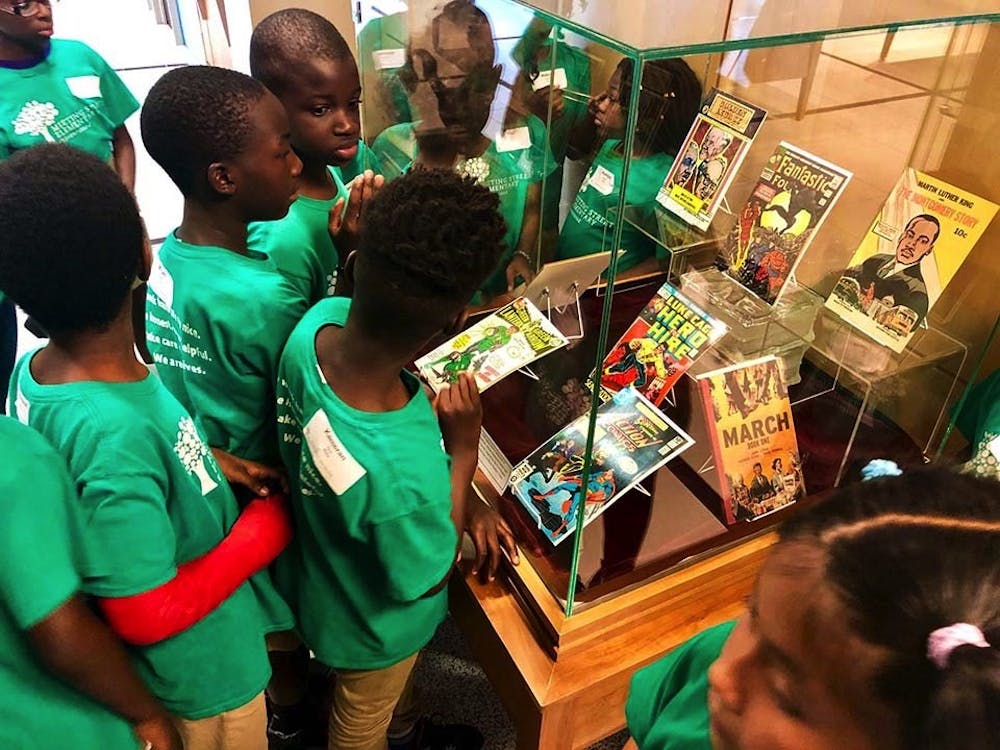In support of the Center for Civil Rights History and Research, additional funding and staff will allow the center to continue as a source of education and research on civil rights, according to Bobby Donaldson, history professor and director of the center.
The center, established in 2015, archives and displays historic materials and serves as a resource for education and research for USC students and community members.
In an email sent July 16 addressing the University History Commission's final report, interim university President Harris Pastides said the university will expand its commitment to education via the center.
Pastides said in an interview with The Daily Gamecock he is very hopeful "that even during my period of interim leadership, there will be a very important announcement about promulgating the South Carolina Civil Rights Center as something that will hopefully be a permanent part of this university and this state's history."
The center does not have a permanent, physical facility on campus. Its exhibits and materials are spread across multiple buildings across the university. The National Parks Service recently gave approximately $1 million in grant funding to renovate the historic Booker T. Washington Auditorium to permanently house exhibits of the center’s material, according to Donaldson.
“I want to see a building where we can really do something that will draw students and community people to campus to learn about this history, and I think you’ve got to have a place to do that,” Thomas McNally, dean of libraries at USC, said.
Additional funding could be used to support traveling exhibits, McNally said.
The university's history and status as a teaching and research institution give it a unique position to facilitate the work the center is doing, Donaldson said. According to Donaldson, the university often was an obstacle of social justice.
“Very often the university played a crucial role in the uprooting and the demolition of Black institutions, and Black neighborhoods. And so, I think we are mindful that we have both a scholarly and a moral responsibility to make sure that we target resources to assist neighborhoods, organizations and institutions and preserve their history and their legacy. History and a legacy that, in some instances, we played a role in uprooting,” Donaldson said.
The center’s “Justice for All” exhibit was on display in the Ernest F. Hollings Library from February to August of 2019. The exhibit contained documents, photographs and film from over 60 collections from university archives and was visited by about 5,000 people, according to Donaldson. There are plans for the collections to be launched as a traveling exhibit in January 2022.
The center’s records contain many “objectionable positions and statements” by Strom Thurmond, Solomon Blatt and other figures who have buildings named after them on campus, Donaldson said.
Many students said they were disappointed the university's board of trustees decided not to hear the recommendations to rename several buildings on campus named for such figures following the release of the commission’s final report.
“I think the work of the commission reminds us that even if we keep buildings named for these individuals, we need to do a much better job of telling a complete and honest history of them, and the center will continue to do that work,” Donaldson said. “Just because the report has come and gone does not mean the work of students comes to an end.”
The center began as a request from USC officials to U.S. Representative Jim Clyburn to store his congressional papers at the university as part of a joint effort between the university libraries system and the College of Arts and Sciences, building on work done by the African American Studies program, according to Donaldson.
After some hesitation, Clyburn agreed to send his papers to USC if an entity were established "where those papers and other papers would be used for both research, teaching and outreach,” Donaldson said.
McNally said he was at an event with Clyburn and then-university President Pastides when the idea of a civil rights center came up in a conversation between the three.
“I looked at Harris, Harris looked at me, and I said, ‘I think we're going to have a Civil Rights Center.’ And Harris said, ‘I think you're right,’” McNally said.
Since then, the center has worked with civil rights organizations and helped school teachers across the state and nation educate about civil rights, according to Donaldson.
“We work closely with students as well, who may be doing research projects on civil rights history,” Donaldson said.
Associate journalism professor Kenneth Campbell said he served on the committee that helped start the Civil Rights Center. He continues to study the role journalism plays in fighting for civil rights in the U.S.
“Those who are advocating for change need to know that they are being heard. And being heard is more than just responding in a verbal way, is more than just saying, ‘We hear you.’ There has to be some action that backs up assertions of, ‘We hear you,’” Campbell said.

